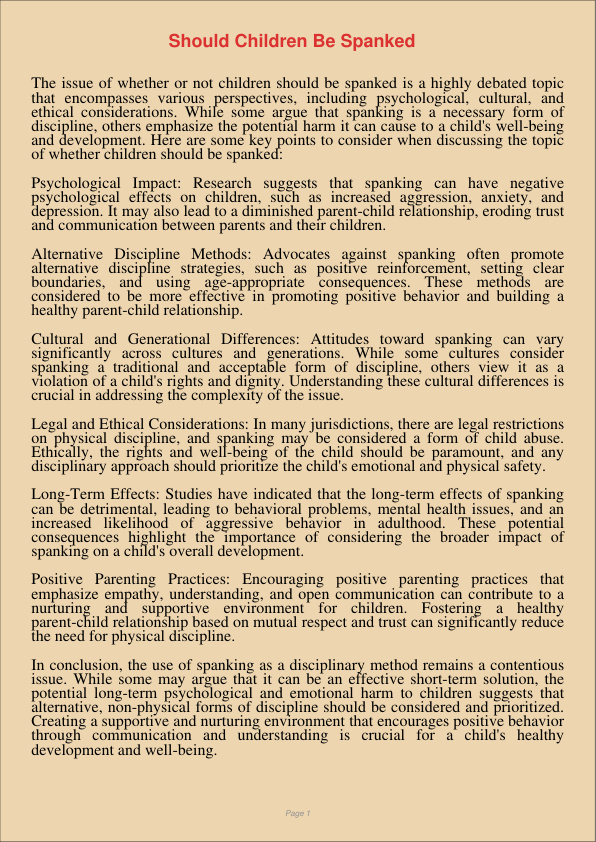Should Children Be Spanked
Dec 31, 2023
spanked
children
Geography
Macro & Microeconomics

The issue of whether or not children should be spanked is a highly debated topic that encompasses various perspectives, including psychological, cultural, and ethical considerations. While some argue that spanking is a necessary form of discipline, others emphasize the potential harm it can cause to a child’s well-being and development. Here are some key points to consider when discussing the topic of whether children should be spanked:
Psychological Impact: Research suggests that spanking can have negative psychological effects on children, such as increased aggression, anxiety, and depression. It may also lead to a diminished parent-child relationship, eroding trust and communication between parents and their children.
Alternative Discipline Methods: Advocates against spanking often promote alternative discipline strategies, such as positive reinforcement, setting clear boundaries, and using age-appropriate consequences. These methods are considered to be more effective in promoting positive behavior and building a healthy parent-child relationship.
Cultural and Generational Differences: Attitudes toward spanking can vary significantly across cultures and generations. While some cultures consider spanking a traditional and acceptable form of discipline, others view it as a violation of a child’s rights and dignity. Understanding these cultural differences is crucial in addressing the complexity of the issue.
Legal and Ethical Considerations: In many jurisdictions, there are legal restrictions on physical discipline, and spanking may be considered a form of child abuse. Ethically, the rights and well-being of the child should be paramount, and any disciplinary approach should prioritize the child’s emotional and physical safety.
Long-Term Effects: Studies have indicated that the long-term effects of spanking can be detrimental, leading to behavioral problems, mental health issues, and an increased likelihood of aggressive behavior in adulthood. These potential consequences highlight the importance of considering the broader impact of spanking on a child’s overall development.
Positive Parenting Practices: Encouraging positive parenting practices that emphasize empathy, understanding, and open communication can contribute to a nurturing and supportive environment for children. Fostering a healthy parent-child relationship based on mutual respect and trust can significantly reduce the need for physical discipline.
In conclusion, the use of spanking as a disciplinary method remains a contentious issue. While some may argue that it can be an effective short-term solution, the potential long-term psychological and emotional harm to children suggests that alternative, non-physical forms of discipline should be considered and prioritized. Creating a supportive and nurturing environment that encourages positive behavior through communication and understanding is crucial for a child’s healthy development and well-being.